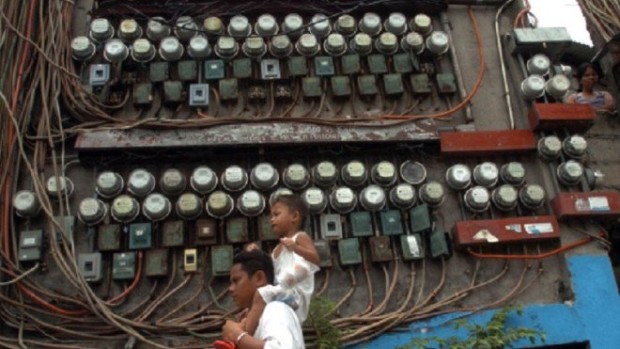
Electricity meters. (INQUIRER FILE PHOTO)
MANILA, Philippines — The House energy panel approved on Tuesday the “Murang Kuryente” bill, which seeks to source P123 billion from the Malampaya fund to pay the debts of the National Power Corporation (NPC) that is now being charged to consumers’ monthly electricity bill.
The Power Sector Assets and Liabilities Management (PSALM) Corporation is the government corporation created through Section 49 of Republic no. 9136 or the Electric Power Industry Reform Act (Epira) inherited all of NPC’s obligations and stranded contract costs.
Section 4 of the still unnumbered substitute bill states that a portion from all the proceeds of the net national government share from the Malampaya Fund amounting to P123 billion would be allocated solely for the payment of the NPC stranded contract costs and stranded debts transferred to and assumed by the PSALM, until 2023.
The said share would be remitted to a special trust fund, included in the General Appropriations Act, and to be administered by the PSALM.
Energy committee chair and Marinduque Rep. Lord Allan Jay Velasco said the Malampaya subsidy could “help consumers” with a “savings of 57 centavos per kilowatt hour” in electricity bills.
1st Consumers Alliance for Rural Energy, Inc. (1-CARE) Rep. Carlos Uybarreta, one of the principal authors, said the “long overdue” measure would be a “big boost in the arm of Psalm.”
According to the Epira, stranded contract costs of NPC or distribution utility “refer to the excess of the contracted cost of electricity under eligible contracts over the actual selling price of the contracted energy output of such contracts in the market.”
In electricity billings, the stranded cost is part of the universal charges being shouldered by consumers, Uybarreta said.
Under the bill, when the liabilities are fully paid before the termination of the corporate life of the PSALM, the fund would accrue back to the special fund to finance energy resource exploration and development programs pursuant to Presidential Decree No. 910.
PSALM is also required to submit annual reports to the Department of Energy and is subject to congressional oversight, the bill added.
PSALM officer-in-charge Lourdes Alzona “welcomed” the measure. In his opening speech, Velasco said Psalm has an existing debt of P90 billion, excluding interest.
The Department of Budget and Management, meanwhile, maintained that the Malampaya fund– which has a P221-billion balance as of Sept. 2018– should be classified as a general fund, Velasco added.
Bayan Muna Chairman Neri Colmenares, meanwhile, warned that the recently passed substitute bill could “circumvent the law governing the funds” and “divert the Malampaya funds so that the executive, through the NPC, can use it for their purposes.”
“Para tuloy hinayaan lang nati
In a separate interview, Velasco said they hope to pass the measure before Congress goes to an election break on February 9.
A similar bill is at the plenary level in Senate, according to Senator Sherwin Gatchalian, chair of the Senate energy committee.
Senate Bill No. 1950, authored by Senate President Pro Tempore Ralph Recto, however, seeks to use the P207-billion Malampaya fund to pay the NPC’s debt.
Gatchalian earlier warned that Filipino households “may have to suffer even more pass on charges as the cash flow projection of the Psalm… shows the necessity of collecting an accumulated universal charge of P0.5593 pesos per kilowatt hour from the year 2020 to 2026.”
This, the senator said, may translate to an additional charge of P111.86 per month for a household consuming 200 kilowatts during the said period. /jpv
READ: Gatchalian pushes 3 energy bills to ease electricity cost